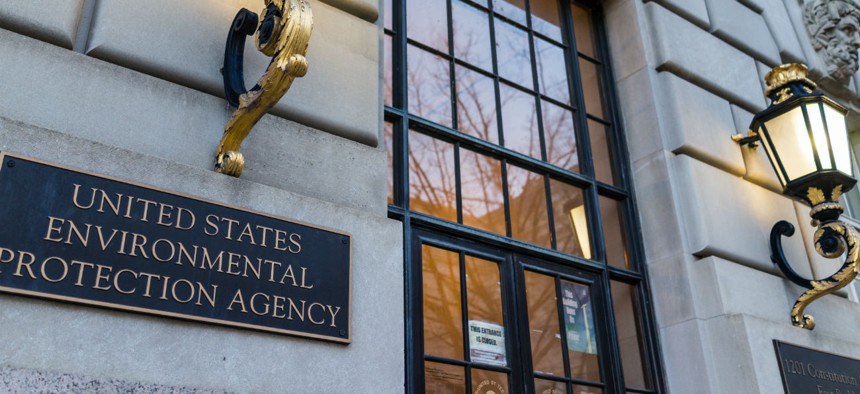Labor Authority Investigator Finds EPA Violated Law with Unilateral Contract
FLRA board cannot adjudicate the case because its general counsel nominee awaits Senate confirmation.
An investigator for the Federal Labor Relations Authority has preliminarily concluded that the Environmental Protection Agency violated federal labor law when it unilaterally implemented a new union contract in July, sidestepping the established process for bargaining disputes.
In June, leadership at the EPA informed the American Federation of Government Employees that it would soon impose a new contract—over the union’s objections—that evicts union representatives from agency office space, severely restricts the use of telework and blocks employees from filing grievances over disciplinary actions. The decision came after AFGE and EPA could not reach agreement on ground rules for talks, a discussion that occurs early in the collective bargaining process.
Since that announcement, AFGE filed two unfair labor practice complaints, accusing the agency of bad faith bargaining and refusing to go through “impasse procedures.” Ordinarily, when parties cannot reach an agreement in negotiations, they seek assistance from the Federal Mediation and Conciliation Service, and if that fails, from the Federal Service Impasses Panel or through arbitration.
The EPA has claimed its actions were legal because of a long-running dispute over the previous agreement, and argued that AFGE refused to agree to negotiate over the entirety of the existing contract. The union has maintained it merely disagreed with a specific ground rules proposal regarding the scope of negotiations, which does not equate to an outright refusal to bargain.
The investigator relayed the finding that the union’s unfair labor practice complaints have merit verbally, and submitted a proposed settlement agreement to both parties this week. That agreement would rescind the unilaterally implemented contract and allow negotiations to commence under the ground rules first established in 2013.
“The agency will not insist to impasse over permissive proposals and subjects, such as opening additional articles or provisions not included in the ground rules agreements,” the proposed settlement states.
In exchange for these concessions, the union would withdraw its complaints.
“EPA violated the law by discarding the labor contract it had previously negotiated with AFGE and imposing a management edict on the 8,000 workers we represent at the agency,” AFGE Deputy General Counsel Cathie McQuiston said. “We are hopeful that EPA management will abide by the FLRA’s findings and swiftly return to the negotiating table to bargain with us in good faith on a new contract that equips employees with the resources and support needed to carry out their vital mission.”
In a statement to Government Executive, an EPA spokesperson declined to say whether management would accept the proposed settlement, and reiterated that the agency’s position is that the unilateral contract is legal.
“Only after years of effort by the agency and AFGE’s clear refusal to negotiate did the agency propose implementing a new contract, which it legally implemented on July 8, 2019,” the spokesperson said. “[The] agency remains dedicated to bargaining in good faith with its unions, and is happy to engage with the Federal Labor Relations Authority to address any of its concerns. However, it should be noted that the FLRA has only suggested a settlement at this point, and has not officially made any determinations.”
The FLRA is unlikely to enforce the investigator’s findings, at least in the short term. The agency general counsel position, which is responsible for bringing unfair labor practice complaints before the FLRA board for adjudication, remains vacant, and the Senate has shown no indication of when it will consider the nomination of Catherine Bird on the floor.




